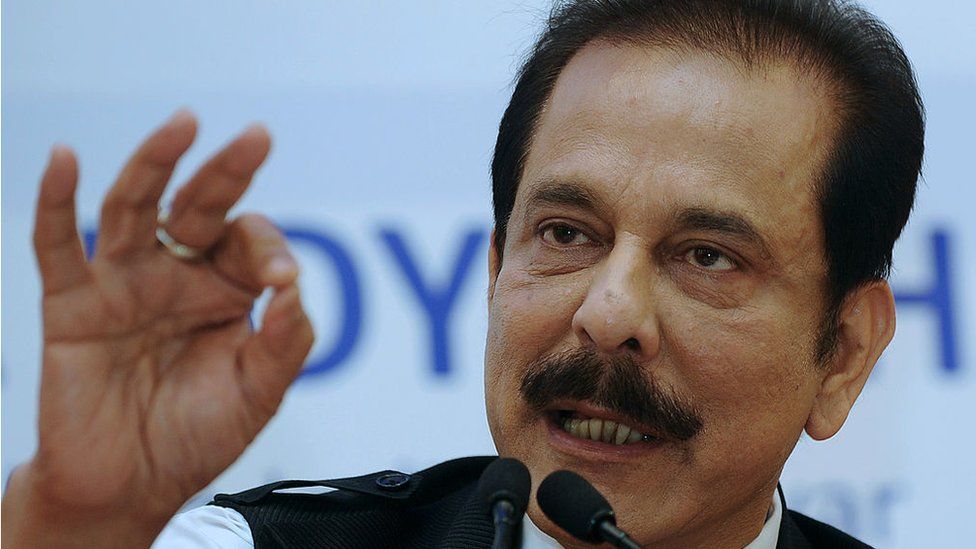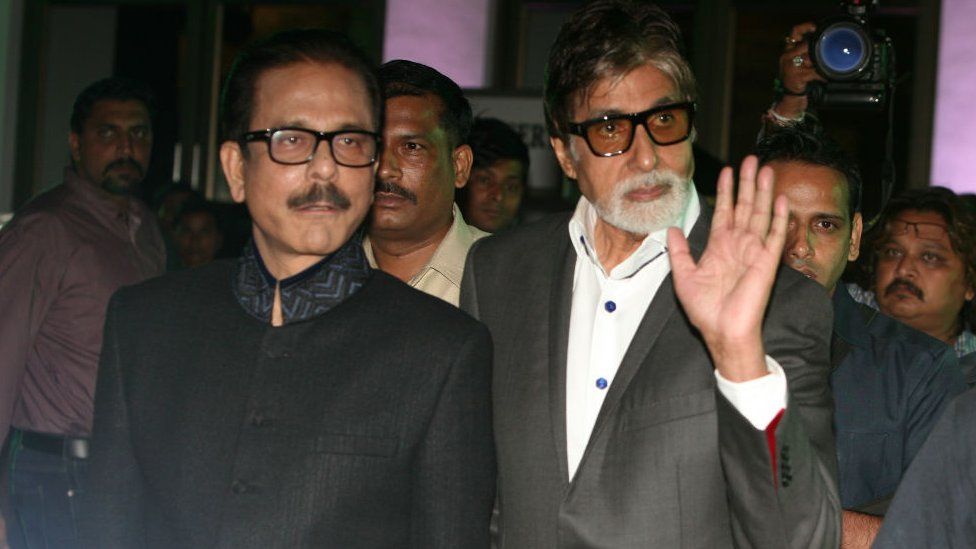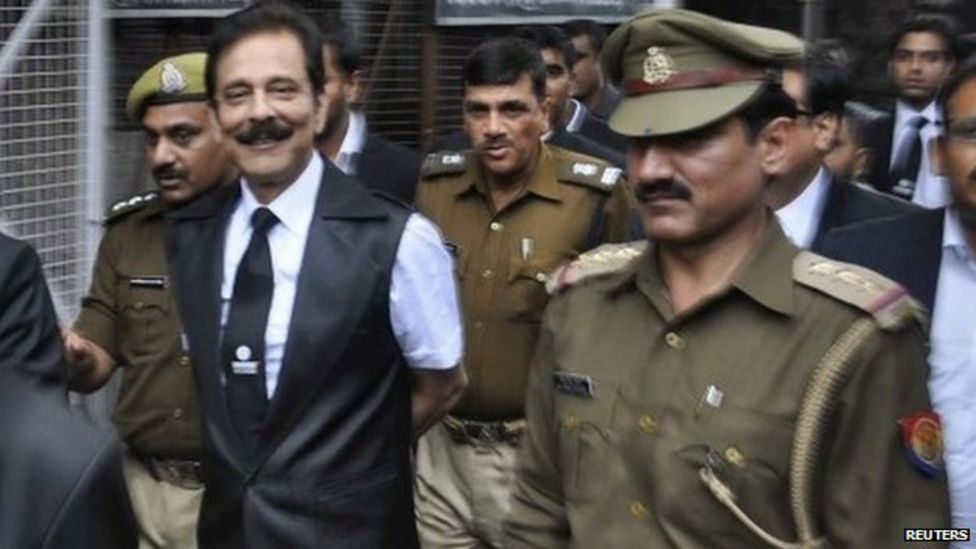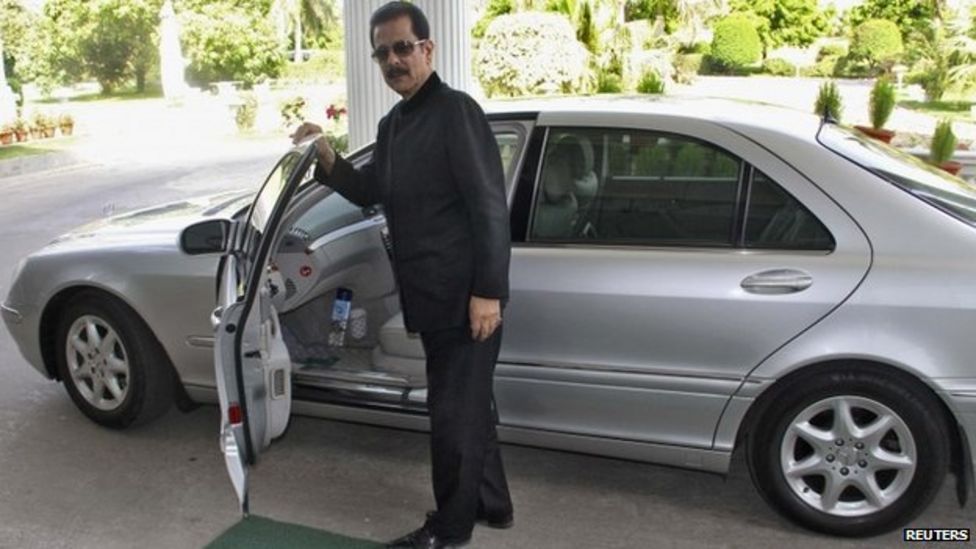Subrata Roy: The chequered legacy of India’s ‘rags-to-riches’ tycoon
-
Published

One of India’s most controversial businessmen, Subrata Roy, died on Tuesday at the age of 75 in Mumbai, the country’s financial capital.
Roy was the founder of Sahara Group – a multibillion-dollar conglomerate with businesses ranging from finance, housing, media, manufacturing, aviation and hospitality.
He died of a cardiac arrest after an “extended battle with complications arising from metastatic malignancy, hypertension and diabetes”, his firm said in a statement.
Roy’s legacy was marked by his swift rise to fame and fortune and a subsequent downfall after his firm was accused of cheating investors of billions of dollars.
But despite his chequered life, Roy remains a fascinating figure in Indian corporate history.

From rags to riches
Roy’s story of overcoming financial hardship to become one of India’s richest businessmen only added to his larger-than-life persona.
He was born in 1948 into an elite land-holding family in the eastern state of Bihar. But his circumstances changed drastically after the death of his father.
A young Roy reportedly sold salted snacks on a scooter to support his family. But he seemed to be gifted with a knack for doing business.
He took over a struggling finance company – Sahara – when he was in his 20s and in 1978 revolutionised its financial model, putting the company on the path to success.
Soon the floundering company – which at one point had capital of just 2,000 rupees ($24; £19) – began flourishing and in the 1990s, it went on to become one of India’s largest business conglomerates, hiring over a million workers in the private sector.
Critics say Roy ran his company like a cult, referring to himself as the “chief managing worker” and guardian of the “Sahara parivar [family]”.
At the height of its success, the firm sponsored the Indian cricket team and also owned a stake in a Formula One racing team, Force India. The group also owned New York’s landmark Plaza Hotel and London’s iconic Grosvenor House (it later sold its stakes in them).

Flamboyant lifestyle
Roy was known for living life king size. At one point, the Sahara boss owned a fleet of private jets and helicopters, expensive cars including Rolls-Royces, Bentleys and BMWs and several properties.
He had a penchant for modelling his homes after famous residences – one of his mansions was built on the lines of the White House; another was a replica of Buckingham Palace.
He also had connections with India’s biggest film stars and politicians.
The wedding of Roy’s two sons in 2004 was attended by more than 10,000 guests, including business moguls, Bollywood idols, cricket stars and fashionistas.
They were flown to the venue in special chartered planes and India’s then Prime Minister Atal Behari Vajpayee also flew down to bless the newly-weds.

Legal troubles
But Roy’s company ran into trouble with the law in the early 2010s.
India’s market watchdog – the Securities and Exchange Board of India (Sebi) – began investigating Sahara after it failed to repay money to investors.
Two Sahara firms had raised 240bn rupees ($3.9bn; £2.3bn) through bonds that were ruled to be illegal.
Sahara had begun raising the money in the mid-2000s from more than 20 million small investors, many of them based in rural India.
Sebi said that Sahara had failed to refund the money despite a court order, but the group said its liability was much less and that it had deposited an adequate amount with the regulator.
In 2014, Roy was arrested after he failed to show up in court over the case. He spent a little over two years in jail and was released in 2016 on bail.
Since then, he mostly stayed out of the media spotlight. But in 2020, he and his company were back in the news after he was included in a Netflix series called Bad Boy Billionaires: India, which traced the stories of Indian businessmen who got into trouble after becoming successful.
BBC News India is now on YouTube. Click here to subscribe and watch our documentaries, explainers and features.

Read more India stories from the BBC:

